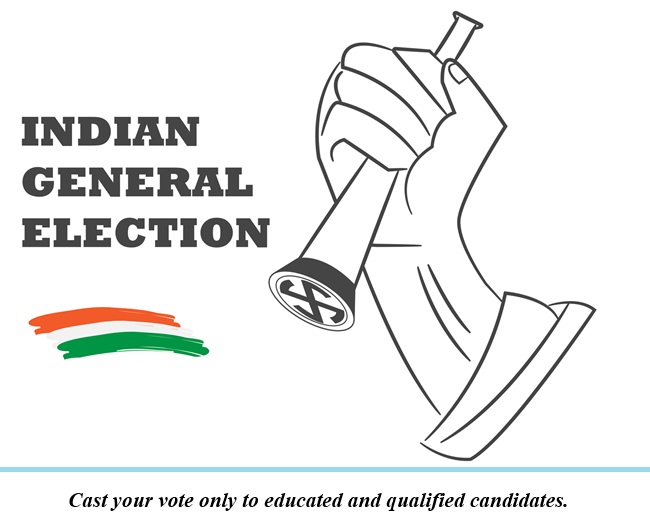Apr 14, 2025
Apr 14, 2025
Politics Common Entrance Test
Why is it that a lawyer must pass the bar, a doctor must clear rigorous medical exams, and a civil servant must endure one of the toughest entrance tests in the world, but politicians, who hold the highest decision-making power in a democracy, need no formal qualification?
Why do we entrust the governance of a billion people to individuals who may lack even the most basic knowledge of the Constitution, economics, or governance?

Is it not time to demand accountability, competence, and professionalism from those we elect to represent us?
The state of Indian politics has long been criticized for its lack of meritocracy. With politics often reduced to a hereditary privilege, power play, or popularity contest, the need for institutional reform has never been more urgent. To commemorate India’s centenary of independence and usher in a new era of governance, I propose a groundbreaking idea: the Politics Common Entrance Test (POLCET) — a standardized test to assess and qualify individuals aspiring to enter politics.
POLCET: Raising The Bar for Political Leadership
The POLCET will act as a qualifying examination for individuals aspiring to contest elections at local, state, or national levels. By creating a uniform benchmark, this test will ensure that every candidate possesses a foundational understanding of governance, law, and leadership. Here's how it will work:
Eligibility Criteria
Indian Citizen: Should be an Indian Citizen by birth.
Test Structure
Examination Details
Languages: The test will be available in English, Hindi, and regional languages to ensure inclusivity.
Why POLCET is the Need of the Hour
1. Professionalizing Politics
Currently, politics lacks the merit-based entry systems seen in professions like law, medicine, or civil services. POLCET will introduce professionalism, ensuring candidates have the knowledge and skills required for governance.
2. Informed Decision-Making
A politician armed with an understanding of economics, law, and governance can make informed decisions. For instance, understanding international law is critical when negotiating trade agreements or addressing border disputes.
3. Accountability & Credibility
The test will filter out candidates who lack the necessary knowledge, ensuring that only capable individuals contest elections. This will enhance public trust in political leaders.
4. Empowering the Electorate
Voters often have limited options, with candidates chosen based on wealth, popularity, or dynastic privilege. POLCET will widen the pool of competent candidates, giving voters better choices.
5. Streamlining Governance
With leaders trained in governance fundamentals, the efficiency of policy implementation will improve, leading to better outcomes for citizens.
The Benefits of POLCET
1. Enhanced Leadership Quality
By ensuring that every political aspirant understands the Constitution, governance frameworks, and global dynamics, POLCET will raise the overall quality of leadership in the country.
2. Focus on Ethics & Accountability
The inclusion of behavioral and psychological assessments will ensure that leaders are not only knowledgeable but also ethically grounded.
3. Restructuring Political Narratives
With informed politicians, election campaigns can shift from divisive rhetoric to issue-based debates, focusing on policies and development.
4. Global Competitiveness
India’s standing on global platforms will strengthen with leaders who can effectively negotiate, strategize, and implement policies aligned with international standards.
5. A Step Toward Meritocracy
POLCET will level the playing field, reducing the dominance of wealth and dynasty in politics. It will open the doors for capable individuals from diverse backgrounds to enter the political arena.
Case Studies & Global Parallels
Challenges & Safeguards
Challenges
Safeguards
Revolutionizing Indian Politics: The Way Forward
POLCET has the potential to transform Indian politics, setting a precedent for other democracies worldwide. As India approaches its centenary of independence, it is imperative to create a system that values knowledge, ethics, and accountability. This reform can pave the way for a new era of governance, where leaders are chosen based on merit rather than money, muscle, or lineage.
Final Thoughts: A Question of Responsibility
Can we afford to leave the governance of 1.4 billion people to chance? Isn’t it time to demand the same level of competence from our politicians as we do from our doctors, engineers, and civil servants? Shouldn’t those entrusted with shaping India’s future demonstrate the knowledge and skills necessary for the task?
As citizens, we have the right to demand a better class of leaders — leaders who are informed, ethical, and capable. Will the government rise to the occasion and implement a system like POLCET? Or will we continue to let politics remain a playground for the privileged few? The time to act is now. Let’s hold our leaders to the standards India truly deserves.
Image (c) istock.com
25-Jan-2025
More by : P. Mohan Chandran

|
The thought itself is not correct. Is there any qualification to write poems, sing songs, write stories novels and to make movies ? So many scientists in history invented , discovered with out prier r eligibility test ! Contrary the teachers of universities are getting job by teaching but dint created or invited arts and science. |

|
This is a must for betterment of our future generation. Qualified, honest and compassionate people can only become great leaders. |

|
Let me Congratulations you for your extraordinary thought for the Sake of the Nation and Inhabitants. Really We are in the Hands of those People Who have long experience in the field of Crime and Corruption and they are the law and society maker. There should be measuring institutions to evaluate valuable contribution of an Individual for the upliftment of the Society. |